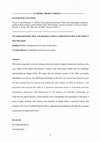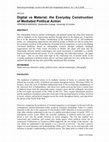Publications by Veronica Barassi

Activism on the Web examines the everyday tensions that political activists face as they come to ... more Activism on the Web examines the everyday tensions that political activists face as they come to terms with the increasingly commercialized nature of web technologies and sheds light on an important, yet under-investigated, dimension of the relationship between contemporary forms of social protest and internet technologies.
Drawing on anthropological and ethnographic research amongst three very different political groups in the UK, Italy and Spain, the book argues that activists’ everyday internet uses are largely defined by processes of negotiation with digital capitalism. These processes of negotiation are giving rise to a series of collective experiences, which are defined by the tension between activists’ democratic needs on one side and the cultural processes reinforced by digital capitalism on the other. In looking at the encounter between activist cultures and digital capitalism, the book focuses in particular on the tension created by self-centered communication processes and networked-individualism, by corporate surveillance and data-mining, and by fast-capitalism and the temporality of immediacy.
Activism on the Web suggests that if we want to understand how new technologies are affecting political participation and democratic processes, we should not focus on disruption and novelty, but we should instead explore the complex dialectics between digital discourses and digital practices; between the technical and the social; between the political economy of the web and its lived critique.
The Communication Review, Jan 1, 2011

This article responds to current critiques about the myths of digital democracy drawing on the ca... more This article responds to current critiques about the myths of digital democracy drawing on the case study of the Italian Movimento 5 Stelle/5 Star Movement (5SM) lead by comedian- turned-politician Beppe Grillo. We argue that the political success of the 5SM was largely dependent on a process of technological fetishism of the Net as an autonomous political agent. We also contend that this process has enabled the party leaders to build an ideology of the movement and represent the 5SM as a grassroots movement based on horizontal networks, participatory democracy, and characterized by the absence of leadership. Conversely, we claim that the digital rhetoric of horizontality, lack of leadership and spontaneity of the party is used to mask, facilitate and reinforce the authority of Beppe Grillo as political leader, thus forging a new type of authoritarianism that is supported and legitimated through the everyday construction of digital discourse.

New Media & Society, Jan 1, 2012
Current internet research has been influenced by application developers and computer engineers wh... more Current internet research has been influenced by application developers and computer engineers who see the development of the Web as being divided into three different stages: Web 1.0, Web 2.0 and Web 3.0. This article will argue that this understanding – although important when analysing the political economy of the Web – can have serious limitations when applied to everyday contexts and the lived experience of technologies. Drawing from the context of the Italian student movement, we show that the division between Web 1.0, Web 2.0 and Web 3.0 is often deconstructed by activists’ media practices. Therefore, we highlight the importance of developing an approach that – by focusing on practice – draws attention to the interplay between Web platforms rather than their transition. This approach, we believe, is essential to the understanding of the complex relationship between Web developments, human negotiations and everyday social contexts.

Research on social movement networks has been defined by an emphasis on structural determinism an... more Research on social movement networks has been defined by an emphasis on structural determinism and quantitative methodologies, and has often overlooked the spatial dimension of networking practices. This article argues that scholars have much to gain if (1) they move beyond the understanding of networks as organisational and communication structures, and analyse them as everyday social processes of human negotiation and construction, and (2) they pay attention to how networks between different organisations create multiple and overlapping spaces of action and meaning that define the everyday contexts of social movements. Drawing on ethnographic research within the Cuba Solidarity Campaign, this article explores the everyday dimension of political and communication networks. It shows that everyday networking practices are embedded in processes of identification and meaning construction, and are defined by a politics of inclusion and exclusion; introducing the concept of ethnographic cartography, it demonstrates that social movement networks are incorporated into everyday practices and narratives of place-making.
Digithum. The humanities in the digital age, Jan 1, 2009

Networking Knowledge: Journal of the MeCCSA- …, Jan 1, 2009
The relationship between internet technologies and political action has often been analysed with ... more The relationship between internet technologies and political action has often been analysed with an emphasis on the empowering qualities brought about by the digital age. Frequently, this is to the detriment of further consideration of the continuing role of 'old'/traditional media, yet, campaigning organisations and political groups in Britain are still investing their few economic resources in the production of printed activist magazines, as well as developing web-based platforms. Based on ethnographic research amongst solidarity campaign organisations and the Trade Union movement in Britain, this paper will show that the relationship between internet technologies and social movements is embedded in a double tension of empowerment and anxiety. It is by considering this ambivalent tension -the paper will argue -that we can shed some light on the continuing role of printed media in the everyday mediation of political action, and we can better appreciate how new media have not replaced old media but may have powerfully transformed their meaning.

This study examines the social and political importance of printed magazines at a time of social ... more This study examines the social and political importance of printed magazines at a time of social and mobile media. It draws on a cross-cultural ethnographic research amongst two different political organisations in Britain and Spain. Although differing in political cultures and strategies, both organisations invest their few economic resources in the production of printed activist magazines, as well as in the development of web platforms. This study investigates why for these political groups’ materiality matters. It argues that looking at why people – and especially grassroots political organisations – remain attached to material forms of communication, whilst at the same time developing online ones, can raise critical questions on the connection between subjectivity, political association and new technologies, as well as on the difference between individualised and collective forms of communication.
Talks by Veronica Barassi
Opinion and Reviews by Veronica Barassi










Uploads
Publications by Veronica Barassi
Drawing on anthropological and ethnographic research amongst three very different political groups in the UK, Italy and Spain, the book argues that activists’ everyday internet uses are largely defined by processes of negotiation with digital capitalism. These processes of negotiation are giving rise to a series of collective experiences, which are defined by the tension between activists’ democratic needs on one side and the cultural processes reinforced by digital capitalism on the other. In looking at the encounter between activist cultures and digital capitalism, the book focuses in particular on the tension created by self-centered communication processes and networked-individualism, by corporate surveillance and data-mining, and by fast-capitalism and the temporality of immediacy.
Activism on the Web suggests that if we want to understand how new technologies are affecting political participation and democratic processes, we should not focus on disruption and novelty, but we should instead explore the complex dialectics between digital discourses and digital practices; between the technical and the social; between the political economy of the web and its lived critique.
Talks by Veronica Barassi
Opinion and Reviews by Veronica Barassi
Drawing on anthropological and ethnographic research amongst three very different political groups in the UK, Italy and Spain, the book argues that activists’ everyday internet uses are largely defined by processes of negotiation with digital capitalism. These processes of negotiation are giving rise to a series of collective experiences, which are defined by the tension between activists’ democratic needs on one side and the cultural processes reinforced by digital capitalism on the other. In looking at the encounter between activist cultures and digital capitalism, the book focuses in particular on the tension created by self-centered communication processes and networked-individualism, by corporate surveillance and data-mining, and by fast-capitalism and the temporality of immediacy.
Activism on the Web suggests that if we want to understand how new technologies are affecting political participation and democratic processes, we should not focus on disruption and novelty, but we should instead explore the complex dialectics between digital discourses and digital practices; between the technical and the social; between the political economy of the web and its lived critique.
The aim of the series, which will take place in 2015 and 2016 for a total of six seminars, is to tackle and critically understand one of the crucial societal changes of our times: the relationship between political participation and media technologies.
The first seminar MOBILISATIONS, CHANGING PROTEST CULTURES AND WEB 2.0 TECHNOLOGIES will be held at
Centre for Global Media and Democracy, Goldsmiths University of London, UK – 14th and 15th of May, 2015 (Professor Stuart Hall Building, LG02 and 314)
This first workshop will look at contemporary ‘protest cultures’ and explore the changing relationship between political participation and media technologies in the age of social media by considering three different dimensions a) organisation b) political imaginations c) lived experience. Scholars and activists will be invited to discuss this relationship by considering culturally and context specific examples. The aim of this workshop is to overcome much of the ethnocentric bias, which can be found in current research, to enable processes of meaningful comparison and to develop a critical and culturally sensitive approach to the analysis of Web 2.0 and social movements.
ALL WELCOMED. This is a free event for anyone interested. However, spaces are limited so make sure that you register your interest by writing to v.barassi@gold.ac.uk by the 8th of May, 2015.